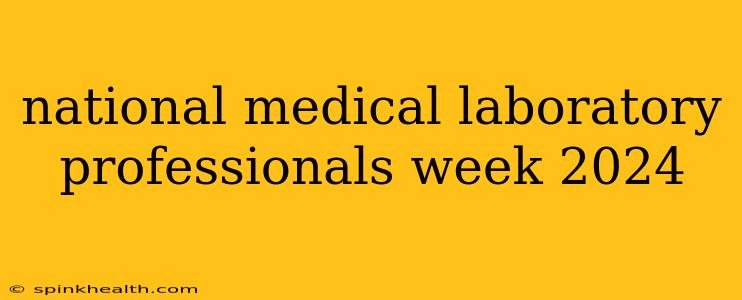National Medical Laboratory Professionals Week (NMLPW), observed annually in the United States, is more than just a week-long celebration; it's a heartfelt tribute to the unsung heroes of the healthcare system – medical laboratory professionals. This year, the celebration falls between April 21st and April 27th, 2024, providing us with a crucial opportunity to recognize the tireless dedication and critical contributions of these individuals. Their work, often unseen yet profoundly impactful, forms the bedrock of accurate diagnoses and effective treatments.
Imagine this: a patient walks into a doctor's office with unsettling symptoms. The doctor orders a battery of tests. Where do those samples go? They go to the lab, where skilled medical laboratory professionals spring into action. They perform complex analyses, meticulously examining blood, tissue, and other bodily fluids, providing the vital information that guides treatment decisions. This isn't just about running tests; it’s about piecing together a puzzle, often under immense pressure, with accuracy and precision as their unwavering guiding principles.
Let's delve deeper into the vital role these professionals play and address some common questions surrounding NMLPW.
What is the Significance of National Medical Laboratory Professionals Week?
NMLPW is a time for collective appreciation. It’s a chance for hospitals, clinics, and healthcare organizations to publicly acknowledge the invaluable contributions of medical laboratory scientists, technicians, and phlebotomists. Without their dedication, the healthcare industry would crumble. Their expertise enables early disease detection, accurate diagnoses, effective treatment monitoring, and ultimately, better patient outcomes. The week is not simply about recognition; it's about highlighting the importance of investing in the field and attracting new talent to this critical sector.
What Do Medical Laboratory Professionals Do?
The scope of work within medical laboratories is incredibly diverse. It encompasses a vast range of specialties and responsibilities, including:
- Clinical Chemistry: Analyzing blood and other bodily fluids to detect imbalances in electrolytes, glucose, enzymes, and other substances.
- Hematology: Studying blood cells and their components to diagnose blood disorders such as anemia and leukemia.
- Microbiology: Identifying and characterizing bacteria, viruses, fungi, and parasites to guide treatment for infectious diseases.
- Immunology & Serology: Analyzing immune responses and detecting antibodies to diagnose infectious and autoimmune diseases.
- Blood Banking/Transfusion Medicine: Ensuring the safe and effective transfusion of blood and blood products.
- Molecular Diagnostics: Using advanced techniques to identify genetic mutations and diagnose diseases at a molecular level.
- Cytogenetics: Studying chromosomes to detect genetic abnormalities.
- Histology: Preparing and examining tissues to diagnose diseases.
- Phlebotomy: Collecting blood samples from patients, a crucial first step in the entire laboratory process.
What are Some Ways to Celebrate National Medical Laboratory Professionals Week?
Celebrating NMLPW can be as simple as a heartfelt "thank you" to your local lab professionals. But there are many other ways to show appreciation:
- Organize a departmental luncheon or gathering.
- Write thank-you notes or cards.
- Create a dedicated bulletin board showcasing the achievements and contributions of lab professionals.
- Nominate outstanding professionals for awards or recognition.
- Share positive testimonials and stories about the impact of lab professionals on patient care.
- Educate the public about the importance of medical laboratory science through social media campaigns.
How Can I Become a Medical Laboratory Professional?
Many pathways lead to a career in medical laboratory science. A strong foundation in science is essential, typically requiring a bachelor's degree or higher. Specific educational requirements will vary based on the chosen specialization and the state licensing requirements. A passion for science, attention to detail, and a commitment to accuracy are crucial attributes for success in this field.
What is the Future of Medical Laboratory Science?
The future of medical laboratory science is bright and brimming with innovation. Advances in technology, such as automation, artificial intelligence, and molecular diagnostics, are transforming the field, allowing for faster, more accurate, and higher-throughput testing. This also leads to the need for professionals who can adapt and embrace these new technologies, emphasizing the need for ongoing education and training. The field is vital in combating emerging infectious diseases and developing personalized medicine approaches.
This National Medical Laboratory Professionals Week, let us not only celebrate their past contributions but also champion their future impact on healthcare. Let's remember that behind every diagnosis, every treatment plan, every successful healthcare journey, there is a dedicated medical laboratory professional working tirelessly to make a difference. Thank you to all the unsung heroes who keep our healthcare system functioning at its best.

